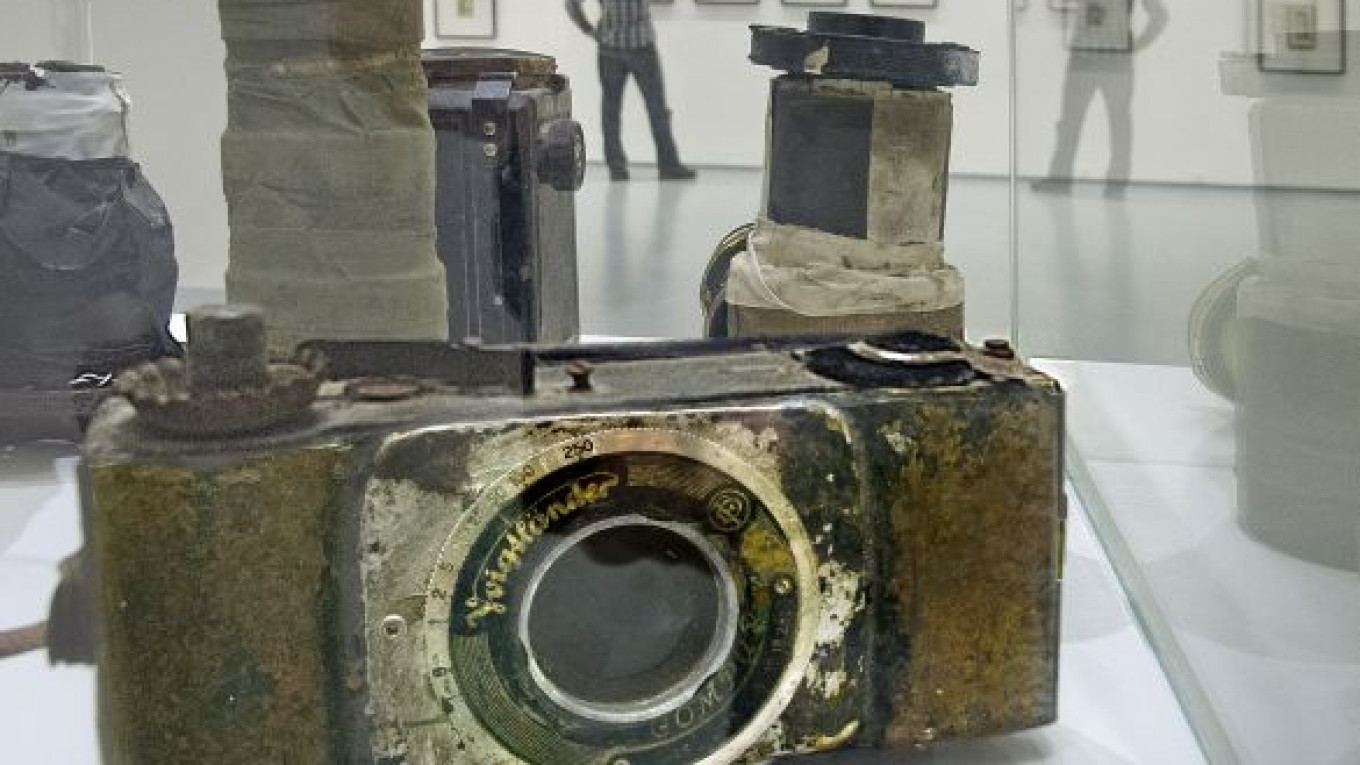It is a generally accepted fact today that if you sneak around taking surreptitious snaps of seminaked women with a camera that you have designed to be easily concealed, you will be arrested rather than have your photos shown in a gallery.
But sometimes art comes from odd places, as can be seen in the exhibit "The Artist With the Bad Camera" that showcases Czech artist, Miroslav Tichy, who made cameras out of scrap materials and did exactly that, sneaking into his local swimming pool and taking photos of women unawares.
His cameras, 30 of which are on show, were made using a mix of everything — plywood, cardboard, children's telescopes, old glass lenses — and held together with little more than glue.
Tichy once explained his unique approach, "If you want to be famous, you must do something worse than anybody in the entire world."
Tichy originally studied art in Prague before being forced into military service. In 1957, he exhibited his paintings for the first and only time and suffered a mental breakdown. This was the end of his artistic career, and the beginning of his life as a recluse. Spending eight years in and out of mental clinics, he grew his beard and hair and never changed his clothes, becoming known as the local "oddball" in his village of Netcice.
"He did this not to be special. It was about getting on without money," the exhibition curator, Roman Buxbaum, an old friend and neighbor of Tichy, told The Moscow Times. "He lived self-
sustainably, looked homeless and even made his washing-machine, for us a symbol of socialist times, out of wood."
Tichy created a daily routine for himself, revolving around his home, his studio in Buxbaum's grandmother's house and the local swimming pool, carrying his camera in a holster like a cowboy, pulling it out quickly and shooting, unobserved.
The exhibition at MAMM displays 150 pieces of Tichy's original work. Most feature women stretching or changing by the poolside or couples in compromising positions; each photograph is framed by Tichy's rough artwork, made from paper bags, newspapers, cartons and even pages from Tichy's passport.
Often the photographs have had smudges or torn edges deliberately added to them to add to the bad camera effect. Each photo is unique, only printed once.
The swimming pool eventually banned Tichy once the women realized that his cameras actually worked.
Buxbaum and Tichy's followers insist that he is a true artist. His work, Buxbaum said, is a "study of the female form, reminiscent of Greek and Renaissance art. … He is not a voyeur the way we know it, but an observer."
Tichy himself only ever had one love affair with a woman, at the age of 22. He is quoted in the documentary "Miroslav Tichy — Being Tarzan," made by Buxbaum as saying "A woman for me is a motif, nothing much else interests me anymore. I am not interested in chasing women. Erotica is just a dream."
Tichy thought little of his photography, considering it a daily habit and a game. It was only when Buxbaum returned from exile in 1981 and spent 25 years documenting his work that his photography began to be viewed more seriously.
Buxbaum persuaded him to showcase his work in Kunsthaus, Zurich in 2005, nearly 50 years after his first show.
Tichy died last year, leaving the world this fascinating, if often disconcerting, collection. He may not have quite achieved the fame Buxbaum craved for him but he has inspired an app — Apple's "Bad Camera" app is based on Tichy's photography.
"Miroslav Tichy — The Artist With a Bad Camera" runs until April 1. Multimedia Art Museum. 16 Ulitsa Ostozhenka. Metro. Kropotkinskaya. Tel. 637-1100
A Message from The Moscow Times:
Dear readers,
We are facing unprecedented challenges. Russia's Prosecutor General's Office has designated The Moscow Times as an "undesirable" organization, criminalizing our work and putting our staff at risk of prosecution. This follows our earlier unjust labeling as a "foreign agent."
These actions are direct attempts to silence independent journalism in Russia. The authorities claim our work "discredits the decisions of the Russian leadership." We see things differently: we strive to provide accurate, unbiased reporting on Russia.
We, the journalists of The Moscow Times, refuse to be silenced. But to continue our work, we need your help.
Your support, no matter how small, makes a world of difference. If you can, please support us monthly starting from just $2. It's quick to set up, and every contribution makes a significant impact.
By supporting The Moscow Times, you're defending open, independent journalism in the face of repression. Thank you for standing with us.
Remind me later.






